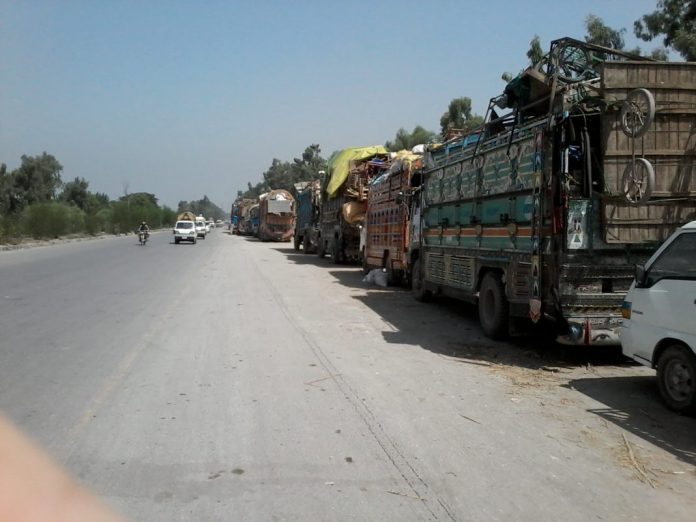Dera Ismail Khan: Alam Sher Mehsud, a tribesman from the Mehsud tribe, came to the city of Dera Ismail Khan in 2010 as a displaced person from the neighboring South Waziristan Agency (SWA) where he lived all his life.
Sher’s family was one of the 80 thousand families that left SWA in 2010 after the Pakistan army started an operation against militants there. Eight years on, he and his family has adjusted to the new city that couldn’t have been more different from the SWA where tribes live in closely-knitted rural communities.
Even though still very much a displaced person who looks forward to returning home, he says he has grown used to a city that is at the confluence of three provinces in Pakistan and the Federally Administered Tribal Areas (FATA). Dera is home to diverse ethnicities including Seriakis, Pashtuns, Punjabis and Balochs etc.
“I feel like I live in Waziristan because there are Pashtu speakers everywhere,” says Sher, 52, who can barely express himself in a language other than Pashtu. “Even Seraiki speakers know Pashtu.”
Apart from being a mainland district touching the southern part of Waziristan, Dera Ismail Khan is geographically linked to the country’s three provinces out of four – and as consequence a city that is linguistically and culturally rich.
In Oct 2010, about 80 thousand families of Mehsuds, a dominant Pashtun tribe in South Waziristan, migrated to this city – the second largest in Khyber Pakhtunkhwa province after its capital Peshawar – where diverse cultures and languages coexist, embracing and confronting each other on a daily basis.
Many of these families are now settled in Dera Ismail Khan and Tank, another district of Khyber Pakhtunkhwa bordering SWA.
In June 2014, another military operation – Operation Zarb-e-Azb – brought 6000 thousand families from the North Waziristan here. They are now registered as Internally Displaced Persons (IDPs) with the local government here in Dera Ismail Khan.
The locals of Dera feel that the Dawar, Wazir and Mahsud tribes from the North and South Waziristans have brought different tribal cultures with them to the city, enriching the local culture.
Even though eight years is too short a time, evidence of acculturation can be observed at multiple levels among interacting cultures. “All these different cultural groups have their own particular way of living which makes Dera a cultural melting pot that is still quite unique to the rest of the country,“ said Zeeshan Qasim, an instructor in Sociology at the Mass Communication Department in Gomal University, Dera Ismail Khan.
According to the last census in 2017, the population of Dera Ismail Khan stood at 217,457 with an annual growth rate of 3.26%. The population is the mix of the ethnic Baloch, Syed, Punjabi Rajput and Pashtun segments, while a significant number of Urdu speaking immigrants are also there. Seraiki is the native language of local people.
Most of the tribesmen from Waziristan did not know the local Saraiki language or the widely spoken or understood national language, Urdu.
“Being an IDP, we faced many problems in accessing shelter and food because we could not express ourselves in Seraiki or Urdu language,” Sher told News Lens. Sher who now lives as an IDP in the Qasorya Town of DI khan has never been to school.
After displacement, most tribesmen have had to learn and speak Seraiki and Urdu in order to survive and become relevant in an ethnic milieu quite different from theirs.
Likewise, many of the local Seraiki people have adopted tribal traditions. They now know about attan, the traditional folk dance that Pashtun tribesmen perform, Pashtu music, attire and cuisine.
Music shops in Dera sell Pashtu CDs released by Waziristani musicians who also sing in Seraiki. The late Kamal Mahsud who used to sing in Seriaki is popular among the Dera community.
“The views of local people about tribesmen have changed after their migration here,” Farooq Adil, a social worker based in Dera, told News Lens. “The locals thought they were savages – that’s the image that books and media give of tribesmen here and in the west. This impression couldn’t be more further from reality. The tribesmen are friendly and hospitable. We participate in each other’s events. Many local people are now married into families that come from the tribal areas.”
Adil said most women form Waziristans had never been to school but after arrival in Dera they had taken to education. On other hand, being restricted to their homes, the women of Waziristans observed purdhah covering their faces with veil). The same culture of purdah is now being adopted by the local women, according to Adil.
Noor Muhammad Mahsud, a tribal elder, said that local cultures and identities are under threat from globalization pushed by the western countries. “Our culture and youth are exposed to globalization under the garb of NGO culture when there is no acceptance of globalization in our tribal community.”
Historically speaking, says former provincial minister and writer Amin Gandapoor, a retired army officer, all conquered tribes have adopted local cultures of the victors, so there is hardly anything different in case of Dera.




